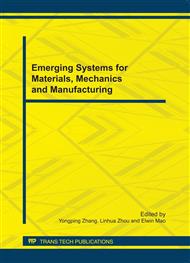p.79
p.84
p.91
p.96
p.100
p.105
p.110
p.114
p.120
Deriving Plastic Constitutive Equations of the Material in Complex Stress State by Means of Simple Test Results
Abstract:
By conducting simple tension and torsion tests to material, constitutive equations of one dimension are obtained. Plastic theories of continuum mechanics are used for analyzing deformation behavior of the material after yielding. Here, material is presumed to have isotropic hardening characteristic. By using Mises loading function and the associative flow rule, the derivations are made to extend the constitutive equations of one dimension in the simple tension and torsion tests to that of multi-dimension and obtain the plastic constitutive equations of the material in complex stress state , respectively.
Info:
Periodical:
Pages:
100-104
DOI:
Citation:
Online since:
October 2011
Authors:
Price:
Сopyright:
© 2012 Trans Tech Publications Ltd. All Rights Reserved
Share:
Citation:


